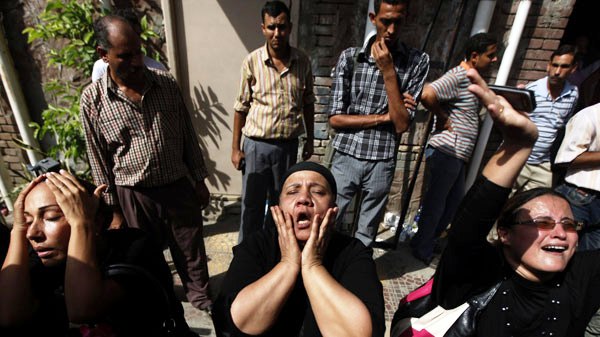Almost three months have passed since the Church of St. Mark and St. Peter in Alexandria was attacked. Locals claim that restoration plans have been successful thus far, but what once stood as a safe haven for Copts now bears the indelible mark of ongoing sectarianism in the country.
Father Makar Fawzy, head priest at the church, told Al-Masry Al-Youm: "We took parts of the walls that were stained with blood and put them together for a memorial we've placed inside the church."
A still unidentified suicide bomber detonated himself in front of the church during midnight mass on New Year's Eve. At least 23 people were killed and 79 injured as a result of the bombing. The church's stained glass murals were smashed to pieces and the walls splashed with blood. The incident triggered an uproar between Egypt's Copts and Muslims, and tensions from the attack still remain.
"[These attacks] are not new to us. We are used to such happenings and we will continue to aspire to the new spirit of the country to make real change," the priest said.
Financing for the restoration came solely from donations placed by Copts in a box inside the church. “We never expected to receive state funding for church restoration,” said the priest. “We as Christians feel that we are strangers in this world, and we are ready for any martyrdom.”
The 40-year-old church should be restored just in time for Coptic Easter, which falls at the end of April.
But reaching that deadline won't quell the worries of many of Egypt's Copts, for whom restrictions on church building and restoration have been a major grievance.
Peter Sabry, a Coptic activist participating in an ongoing Coptic protest movement next to the State Television building on Cairo's Nile corniche, said he was demonstrating to demand the safe reconstruction of a church in Helwan. It was torched on 4 March by Muslims objecting to a relationship between a Coptic man and a Muslim woman.
"The army promised to rebuild the church by Easter but we already know the army is not rebuilding the church from a new foundation. They're using the same foundation, and that means the church could collapse during mass. The church must be built on a new foundation."
The Helwan church burning reminded Egypt's Coptic community of the kind of religious strife they have dealt with in recent months. Fears are mounting among the community that a post-revolutionary Egypt could witness the imposition of Islamic rule in the country, and that further deepens their grievances.
Last November police with tear gas and riot shields raided a church under construction in Omraneya. Although residents confirmed that the local governor had approved it, police claimed that it violated construction regulations — but most buildings in the area fall short of the legal requirements.
Church building laws in Egypt currently require the decree of the district governor, a requirement which has met with much opposition and dissent from human rights activists. Rights watchdogs have called for a unified law governing the building and restoring of places of worship that does not discriminate between churches and mosques.
According to the Ministry of Religious Endowments, there is a strong disparity between the number of mosques and churches in Egypt. Although Copts comprise almost 10 percent of the country’s population, Egypt contains only 2000 churches compared with 93,000 mosques.



